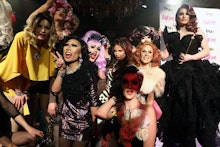Pretty Much Everything We Say Comes From the World of Drag Queens

Ever called someone "shady" when they dissed your new shoes? Have you shouted "werk, gurl!" when a friend strutted down the hall in their new outfit? These popular terms seemed to come out of almost nowhere, but they didn't: Their origins are in the gay community. More specifically, they're in the drag community.
Before you told your friends you were "serving some Starbucks barista realness" and posting it on Instagram, the queens at the drag balls were using "realness" to describe passing. Before you exclaimed "yaass" when a celebrity favorited your tweet, RuPaul's Drag Race had been using it for nearly a decade.
Yes, slang from the drag community has gone mainstream. On some level, it may seem like a form of appropriation, on the level of Madonna's "Vogue," which she took from the drag community and claimed as her own. But, with acknowledgment of origin and mutual respect, these terms can become cornerstones of modern vernacular — as they have.
To celebrate the end of Pride, let's take a look at where the terms you probably love using came from.
"Yaaasss"
Even though it finds its origin in Glasgow, as can be heard in Scottish accents, in the United States it's predominantly used by gay men and has trickled into the vernacular of (mostly) heterosexual young women. It was popularized by one video depicting Lady Gaga walking out of her hotel room, fans cheering excitedly.
However, as can be seen on any episode of RuPaul's Drag Race, the term is incredibly popular among the drag community. Its usage exists primarily as a form of excitement and satisfaction, really not much different than saying "yes!"
"Serving [blank] realness"
To "serve realness" is "to be able to blend," as drag queen Dorian Corey explains in Paris Is Burning. She talks over a montage of young gay men emulating different styles, fashions and, most importantly, personae. The word that comes before "realness" is always denotative of a style, era or even demeanor. The performance of "passing" (as straight or as a woman) is especially important, as Corey elaborates. While that definition has expanded to the idea of fitting specifically created personae, to perfectly inhabit a particular crafted identity still remains paramount.
As many of these phrases come from minority groups within the LGBTQ community, "realness" strikes a chord within the drag community as it gives performers a chance to do just that: perform within the society of those that would normally reject them — or have rejected them.
"Realness" strikes a chord within the drag community. It gives queens a chance to perform within the society of those that would normally reject them.
"[Blank] gives me life"
Much of drag vernacular comes from black gay culture, which is particularly interesting given the strange relationship it has had with white gay culture. At once, black gay culture has had to both carve out a community for its own members, as well as assimilate into white gay culture. Meanwhile, white gay culture has merely appropriated black gay culture. "Gives me life" is an example of that, as are most of the phrases featured here.
This particular phrase describes when something is exciting and stimulating. Ironically, there is some evidence to suggest it's a subversion of Biblical verse. In Job 33:4, it reads, "The Spirit of God has made me; the breath of the Almighty gives me life." The recontextualization of this into a culture that has been historically rejected by much of Christianity makes the origins of this rather fascinating. It, shall we say, gives us life.
"Shade"
Years ago, the mother of the House of Corey elaborated on the minute differences between "shade" (snarky, snotty insults) and "reading" (snarky, snotty insults that everyone is in on and is meant more jocularly) in Paris Is Burning. In the present, this term has perhaps experienced the biggest crossover to dominant culture. It even appeared as an "answer" on Jeopardy! recently.
Throwing shade, as Corey explains, is nastier and meaner, but retains a kind of wit and slickness to it. Reading has yet to enter cultural ubiquity, but there's still time.
"Werk"
Again finding its origins in black gay culture, "you better werk" has become synonymous with RuPaul. The word by itself has extended to broader use, though its essential meaning is the same: a declaration of support or approval or ambition. There's something to be said of the spelling, or rather, the intentional misspelling, present not only textually but in pronunciation.
These are just a few terms from drag culture that have found use in a broader cultural lexicon. Often, even the tone with which one uses these terms can be credited to that subculture. When using these phrases, keep their origin in mind, and keep an ear out for what drag queens are saying. That way, you'll be up on the slang — and you'll know where it came from, too.
Correction: June 30, 2015